| Listing 1 - 8 of 8 |
Sort by
|
Book
ISBN: 9781009019644 1009019643 1009022350 9781009467995 9781009011488 Year: 2024 Publisher: Cambridge Cambridge University Press
Abstract | Keywords | Export | Availability | Bookmark
 Loading...
Loading...Choose an application
- Reference Manager
- EndNote
- RefWorks (Direct export to RefWorks)
The biological world is full of phenomena that seem to run counter to Darwin's insight that natural selection can lead to the appearance of design. For instance, why do organisms in some species divide reproductive labor? The existence of non-reproducing organisms in such 'eusocial' species looks to be at odds with an evolutionary theory which posits traits exist because they help organisms survive and reproduce. What is the evolutionary advantage of an insect being distasteful to its predators? The distastefulness appears designed to deter predators, but can only affect the predator's actions when the insect is eaten; it is hard to see how such a trait could be passed on. This Element will cover the shared foundations of evolutionary explanations for these and other seemingly puzzling phenomena, focusing on the concepts of inclusive fitness and kin selection.
Natural selection. --- Kin selection (Evolution) --- Behavior evolution.
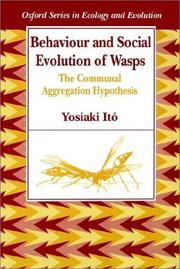
ISBN: 0198546831 0198540469 Year: 1993 Publisher: Oxford : Oxford university press,
Abstract | Keywords | Export | Availability | Bookmark
 Loading...
Loading...Choose an application
- Reference Manager
- EndNote
- RefWorks (Direct export to RefWorks)
In this book, Ito presents data on tropical wasps which suggest that kin-selection has been overemphasized as an evolutionary explanation of sociality. He concentrates on the Vespidae (paper wasps and hornets), a group much discussed by evolutionary biologists because it exhibits all stages of social evolution: subsociality, primitive eusociality, and advanced eusociality. The author reports field observations by himself and others in Central America, Asia, and Australia, showing that multiple egg-layers in a nest are not uncommon. Because coexistence of many 'queens' leads to lower relatedness among colony members than in single-queen colonies, he suggests that kin-selection may not be the most powerful force determining observed social patterns. Instead, subsocial wasps may first have aggregated for defense purposes in habitats with a high risk of predation, with mutualistic associations among many queens. Through parental manipulation and then kin selection, differentiation into within-generation castes may have followed. Of interest to all students of ecology, evolution, and behavior, this book beautifully demonstrates the author's ability to combine wide-ranging data with thoughtful questions.
Insect societies. --- Kin selection (Evolution). --- Social evolution in animals. --- Wasps --- Behavior.
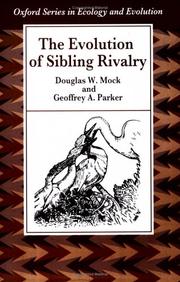
ISBN: 0198577443 Year: 1997 Publisher: Oxford : Oxford university press,
Abstract | Keywords | Export | Availability | Bookmark
 Loading...
Loading...Choose an application
- Reference Manager
- EndNote
- RefWorks (Direct export to RefWorks)
Competition (Biology). --- Familial behavior in animals. --- Kin selection (Evolution). --- Sibling rivalry.
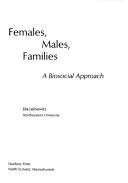
ISBN: 0878721584 Year: 1978 Publisher: North Scituate (Mass.) : Duxbury press,
Abstract | Keywords | Export | Availability | Bookmark
 Loading...
Loading...Choose an application
- Reference Manager
- EndNote
- RefWorks (Direct export to RefWorks)
Familial behavior in animals. --- Families. --- Family. --- Kin selection (Evolution). --- Sex differences.
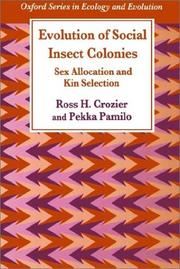
ISBN: 0198549423 0198549431 Year: 1996 Publisher: Oxford : Oxford University Press,
Abstract | Keywords | Export | Availability | Bookmark
 Loading...
Loading...Choose an application
- Reference Manager
- EndNote
- RefWorks (Direct export to RefWorks)
Insect societies --- Kin selection (Evolution) --- Sex allocation --- Sociétés d'insectes
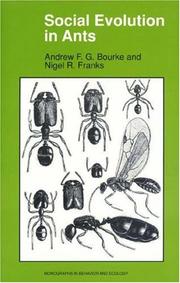
ISBN: 0691044260 Year: 1995 Publisher: Princeton, N.J. : Princeton University Press,
Abstract | Keywords | Export | Availability | Bookmark
 Loading...
Loading...Choose an application
- Reference Manager
- EndNote
- RefWorks (Direct export to RefWorks)
Ants --- Kin selection (Evolution) --- Sex ratio --- Social evolution in animals --- Fourmis --- Sex-ratio --- Behavior --- Moeurs et comportement
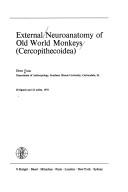
ISBN: 3805526334 Year: 1977 Publisher: Basel Karger
Abstract | Keywords | Export | Availability | Bookmark
 Loading...
Loading...Choose an application
- Reference Manager
- EndNote
- RefWorks (Direct export to RefWorks)
Familial behavior in animals --- Japanese macaque --- Japanese macaque --- Kin selection (Evolution) --- Social behavior in animals --- Behavior --- Genetics

ISBN: 0691059330 0691059349 0691206821 Year: 1998 Publisher: Princeton, NJ : Baltimore, Md. : Princeton University Press, Project MUSE,
Abstract | Keywords | Export | Availability | Bookmark
 Loading...
Loading...Choose an application
- Reference Manager
- EndNote
- RefWorks (Direct export to RefWorks)
This is a theoretical treatment of one of the central problems in evolutionary biology, the evolution of social cooperation and conflict. Steven Frank tackles the problem with a highly original combination of approaches: game theory, classical models of natural selection, quantitative genetics, and kin selection. He unites these with the best of economic thought: a clear theory of model formation and comparative statics, the development of simple methods for analyzing complex problems, and notions of information and rationality. Using this unique, multidisciplinary approach, Frank makes major advances in understanding the foundations of social evolution. The book also provides a unique "how-to" guide for constructing models of social behavior. It is essential reading for evolutionary biologists and for economists, mathematicians, and others interested in natural selection.
Natural selection --- Behavior evolution --- Kin selection (Evolution) --- Social evolution --- Sélection naturelle --- Evolution du comportement --- Econometric models --- Behavior evolution. --- Kin selection (Evolution). --- Natural selection. --- Econometric models. --- Sélection naturelle --- Évolution sociale --- Selection de la parentele. --- Évolution du comportement. --- Selection naturelle. --- Social evolution. --- Sociale evolutie. --- Natuurlijke selectie. --- 42.21 evolution. --- Selection (Genetics) --- Biological Evolution. --- Darwinism --- Selection, Natural --- Genetics --- Variation (Biology) --- Biological invasions --- Evolution (Biology) --- Heredity --- Familial behavior in animals --- Cultural evolution --- Cultural transformation --- Culture, Evolution of --- Culture --- Evolution --- Social change --- Behavioral evolution --- Evolutionary psychology --- Animal evolution --- Animals --- Biological evolution --- Evolutionary biology --- Evolutionary science --- Origin of species --- Biology --- Biological fitness --- Homoplasy --- Phylogeny --- Modeles econometriques.
| Listing 1 - 8 of 8 |
Sort by
|

 Search
Search Feedback
Feedback About UniCat
About UniCat  Help
Help News
News